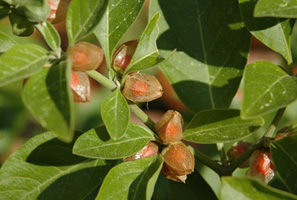Ashwagandha root (Withania somnifera) is considered a most important herb in Ayurvedic medicine. Its ability to serve as a tonic and adaptogen in many of the same ways as Panax ginseng is used in Traditional Chinese Medicine (TCM) is well known. It is one of the best herbs for building libido and fertility for both men and women. Unlike Ginseng, Ashwagandha is easily grown and the roots require only a year to harvest, and so is relatively inexpensive.
A recent study by Indian researchers released in December of 2008 and published in Fertility and Sterility in 2009 has supported the well known benefit of Ashwagandha as a male sexual tonic.
Infertility is defined as the failure of a couple to conceive after 12 months of unprotected sexual intercourse. It affects 15% of all couples with approximately 50% of these having detectable male partner abnormality, usually of low sperm count and lack of sperm motility.
In general, there is a lack of specific medically effective therapies for male infertility. However, both Ayurvedic and Chinese herbal medicine as well as other systems of traditional herbal medicine around the world offer many effective options. The Ayurvedic herb Ashwagandha (sometimes known as Indian ginseng) is one such option, and that a modern scientific study has been found to be effective is of great value.
In this study, 75 normal, healthy and fertile men were used as the control subjects. Another 75 men undergoing infertility screening were the experimental group. Testosterone and other sex hormones were measured during treatment. It was found that Ashwagandha served as an antioxidant, inhibiting lipid peroxidation and protein carbonyl content and thus improving both sperm count and motility. It seemed that the infertile men recovered seminal plasma levels of antioxidant enzymes along with vitamins A, C and E and corrected fructose. Treatment also significantly increased serum testosterone and luteinizing hormone and reduced the levels of follicle stimulating hormone (FSH) and prolactin (PRL) from the pituitary that would inhibit male fertility.
Thus Ashwagandha was found to effectively reduce oxidative stress and thereby proving its traditional use as a sexual tonic for men.
Male impotency can have many causes, including physiological and psychological ones. However, many if not most cases of functional male impotency are accompanied with low sperm count and low sperm motility. While Ashwagandha can serve as an aphrodisiac in stimulating libido in both men and women, it is even more valuable when thought of as an herb that builds semen potency as well.
Photo above from www.biology.washington.edu

